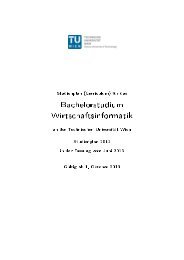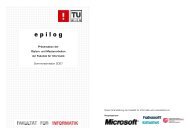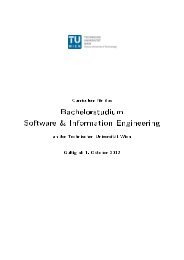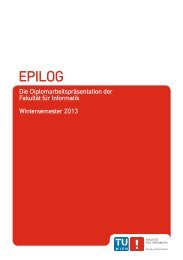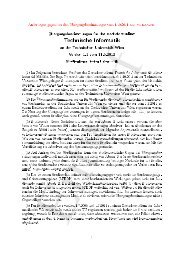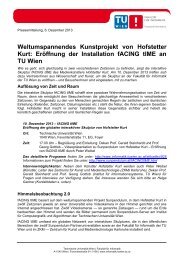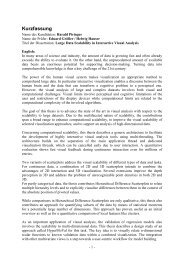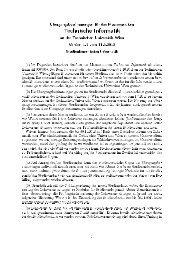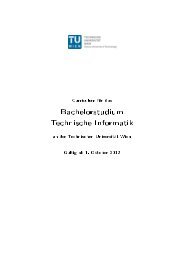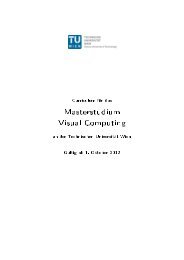Masterstudium Business Informatics - Fakultät für Informatik, TU Wien
Masterstudium Business Informatics - Fakultät für Informatik, TU Wien
Masterstudium Business Informatics - Fakultät für Informatik, TU Wien
Create successful ePaper yourself
Turn your PDF publications into a flip-book with our unique Google optimized e-Paper software.
• Introduction to model engineering: Principles and goals; basic architecture of Model<br />
Engineering (ME); notions and denitions; preliminaries and results; approaches;<br />
tool support<br />
• Metamodeling: Meta languages; metamodeling languages; metamodeling tools;<br />
language architecture of UML; language extension mechanisms (UML Proles);<br />
domain-specic modeling languages; model serialization and persistence (XMI)<br />
• Object constraint language: Formal specication languages; OCL language constructs;<br />
OCL libraries and tool support; OCL as query language and as constraint<br />
language; design by contract with OCL<br />
• Model transformation: Model transformation patterns; model transformation languages;<br />
graph transformations; transformation standard<br />
• Code generation: Descriptive vs. constructive models; platform specic code generation;<br />
template languages; design patterns for code generation<br />
• Dening concrete syntax: Textual modeling language; graphical modeling language<br />
• Model evolution: Notions and denitions; metamodel evolution and model coevolution;<br />
metamodel evolution and transformation co-evolution; parallel model<br />
evolution<br />
Expected Prerequisites:<br />
The contents of the bachelor modules INT/PRO - Programmkonstruktion, INT/SEP -<br />
Software Engineering und Projektmanagement , and WIN/MOD - Modellierung.<br />
Teaching and Learning Methods and Adequate Assessment of Performance: The module<br />
is organized along lectures, labs, and practical exercises in small groups.<br />
Courses of Module:<br />
6.0/4.0 VU Model Engineering<br />
Innovation Implementation<br />
ECTS-Credits: 6.0<br />
Summary: This is the third module out of four. It focuses on the implementation of<br />
innovations. It comprises practical aspects such as legal, nancial, and social issues,<br />
which are complementary to and often critical for the innovation process.<br />
Learning Outcomes:<br />
Knowledge:<br />
• Funding aspects of innovation<br />
• Legal and nancial issues of company creation<br />
37



